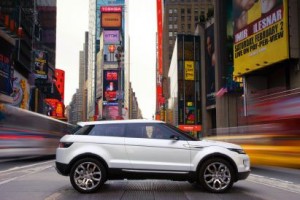
Land Rover has approved production of the LRX, which Gary Temple promises is a model of an environmentally-friendly Land Rover.
Earlier this month, the British SUV maker, Land Rover, confirmed that it will be going into production with its distinctively styled LRX concept vehicle. But the news was accompanied by an unusually blunt assessment of the current economy and the company’s precarious fate – its global sales are down by roughly a third since the recession began.
A few years ago, that might not have been a problem, when Land Rover was owned by the American automaker, Ford, which seemed content to endlessly finance the loss-making company, but that was before its sale to the ambitious Indian carmaker, Tata.
For a sense of the challenges facing Land Rover – and its sibling brand, Jaguar – TheDetroitBureau.com spoke with Gary Temple, president of Jaguar Land Rover North America. Based in New Jersey, Temple started working with the Jaguar brand in 1983, then switched to Land Rover after it was purchased by Ford in 2000. Here’s his candid assessment of what’s ahead.
TheDetroitBureau: How have the challenges you face changed since the acquisition of Jaguar and Land Rover (JLR) by India’s Tata Motors?
Temple: Our challenges were always internal, to come up with the finances to build new models, and to overcome our quality problems. Now our challenge is mostly external: the economy.
TDB: JLR recently issued an unusual press statement acknowledging the difficulty of its current situation, and the need to shift directions towards a more sustainable type of product. Why so blunt?
Temple: It’s been a long, hard struggle to secure the financing to get through these economic times. Sometimes you have to go out and tell people what you’re going to do and what you’re going to be, so that was to kill some of the speculation out there and to show that Tata is in full support of the two brands.
TDB: So, what can we expect to come from Land Rover?
Temple: Not only (a production version of) the LRX has been approved, but other models to come. Executive management has taken the stance that we’re going to be bold in the marketplace.
TDB: How is the current situation different from what you faced while under the ownership of Ford Motor Co.?
Temple: It’s different from what happened under Ford, when we fought to get our fair share under the (broad) Ford portfolio. As long as things were good, you were taken care of. Since Tata has bought JLR, we’re a company that has to succeed on its own. We’re responsible for cash flow at the end of the day. It’s a whole different way of running the company.
TDB: What are some examples of how things are being done differently?
Temple: I always like to think I was responsible, but now I look at every decision a little longer and a little harder – how I hire people, how we launch a vehicle. Now I can really say that the buck stops here.
TDB: As you mentioned earlier, many things have changed, externally. The SUV used to be the defining car of the American market, but suddenly it’s facing pressures from rising fuel prices, environmental concerns and changing social attitudes. For a company like Land Rover, which focuses specifically on SUVs, that has to be tough.
Temple: It means we have to become a much more responsible company in the way we design our vehicles and how they affect everything from recycling to fuel economy. I believe there will always be a market for (the traditional) SUV, but it behooves us to develop vehicles much more friendly to the environment. That’s what was behind the LRX, which was started three years ago, when we understood we needed a vehicle much more fuel-efficient and green.
TDB: It’s definitely not the traditional, boxy Land Rover.
Temple: It pushes the envelope of what an SUV can be, and as more news comes out on LRX, you will see just how environmentally-friendly that vehicle will be. I’m struggling to get past the next two to three years, but if I were a betting man, I would say that a decade out, we’ll be producing more environmentally-friendly vehicles.
TDB: Tata purchased both Land Rover and Jaguar, and the two companies operate so closely together, is that going to change?
Temple: I don’t think that’s changing, at all. It’s still one company with two brands. This company will only survive if they survive together. I don’t think that changed when we went to Tata.
Q&A: Land Rover’s Gary Temple
